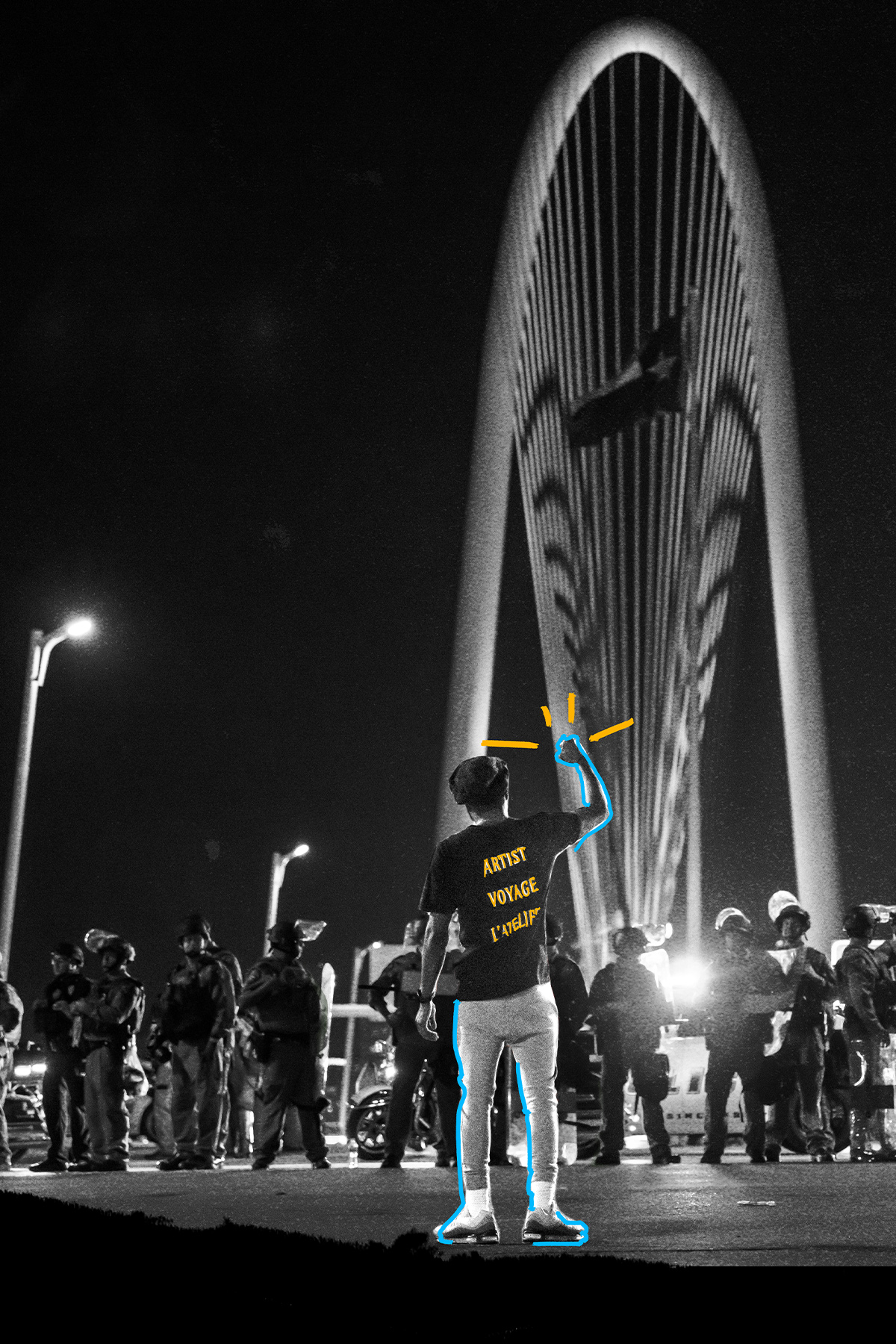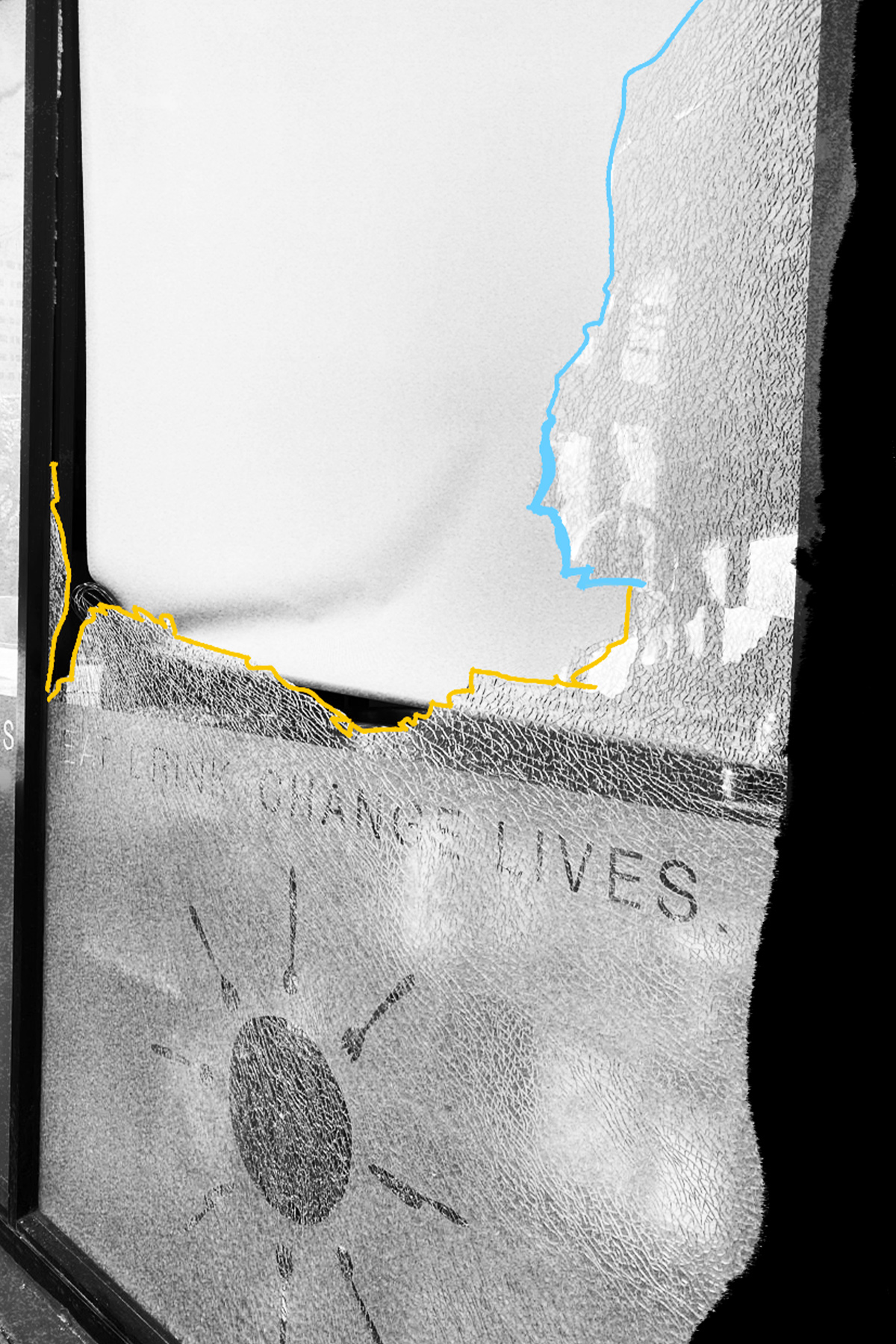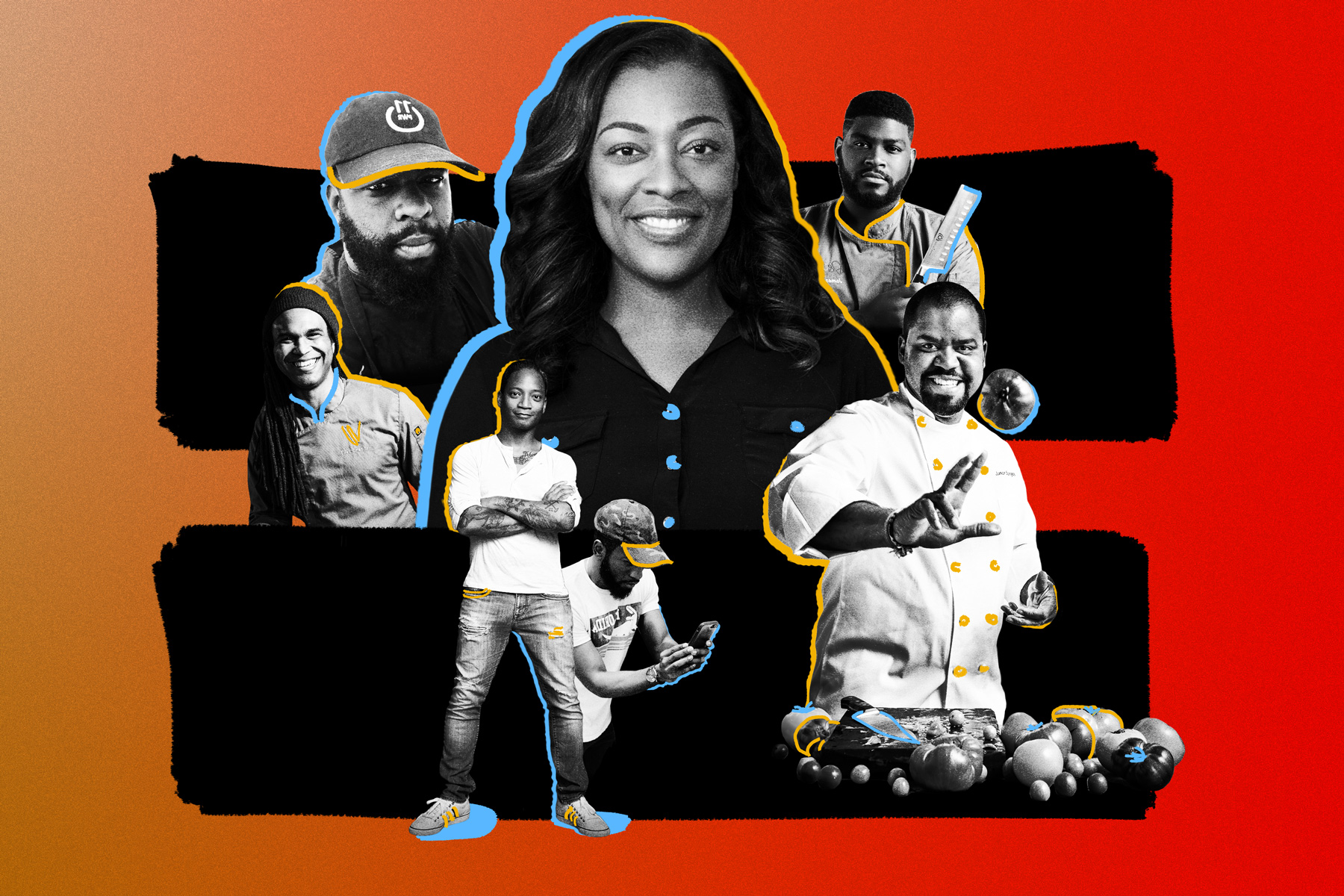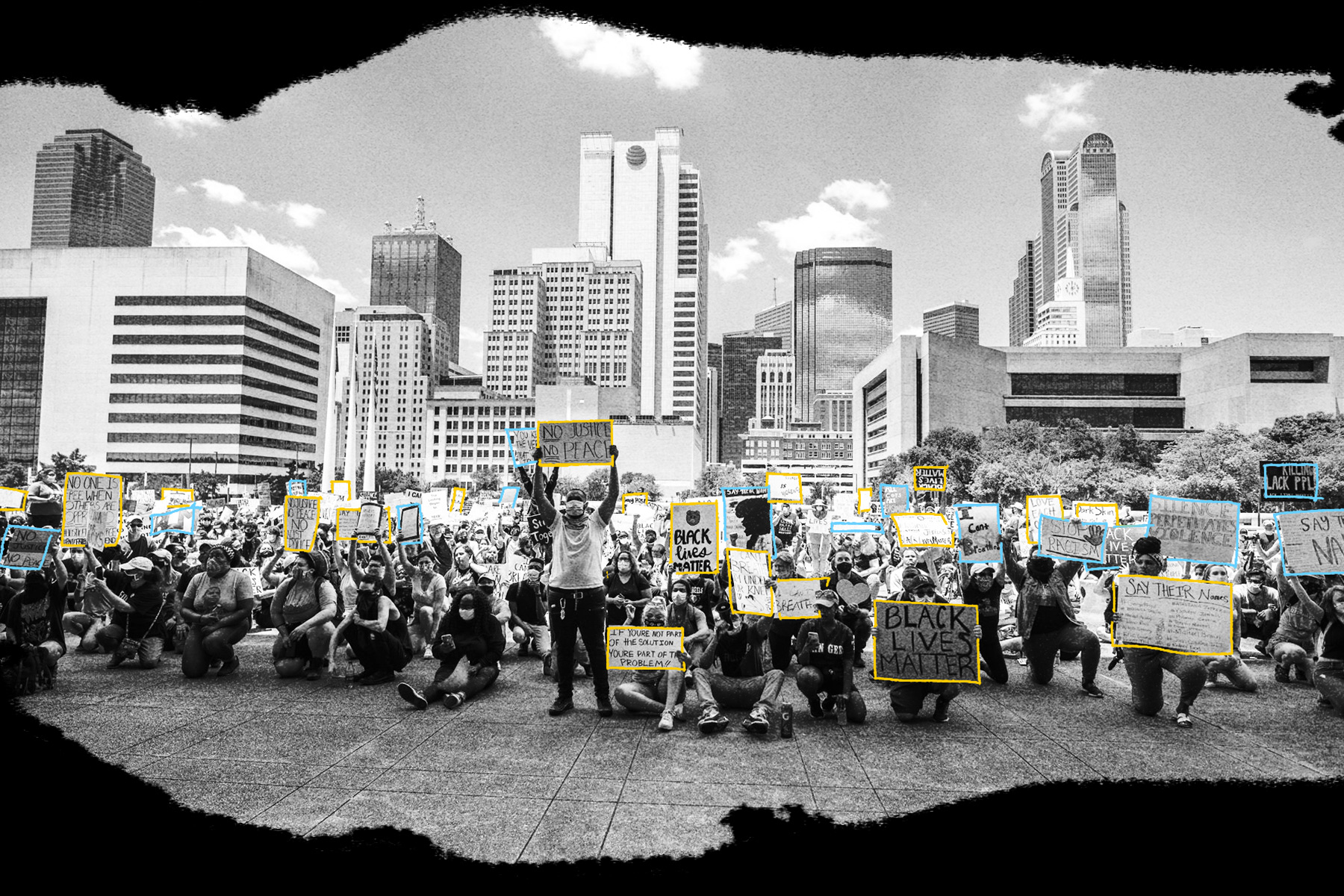Dallas, like every city in the U.S. right now, is in a moment of struggle, action, and reflection. For many of us, the news feels raw and charged and galvanizing. For those in Black communities especially, it’s a struggle that is all too familiar.
As we wrestle with this greater reckoning of systemic and racial injustice, we can also look to food. At the most fundamental level, food is what nourishes us; it’s a necessity, like air is to breath. It is also the product of someone’s labor.
We’ve asked some of Dallas’ Black leaders in the food community to share their thoughts and own calls to action within the industry as we watch protesters calling for a better world. Even asking Black voices in the food world is itself requesting a labor.
Let’s listen. Let’s ask ourselves how we can respond to the concerns raised and reflect on the fact that these disparities have inflected every part of the food world. (These interviews have been edited for length and clarity.)
Omar Yeefoon
Omar Yeefoon owns Shoals Service & Sound in Deep Ellum, which he opened with Michael Martensen in 2017. As a Deep Ellum resident himself, Yeefoon has been watching the goings-on in his neighborhood and community—one of his bartenders was even detained on the Margaret Hunt Hill Bridge last weekend—but as he points out, this moment stretches back years.
Generationally I’m tied to this cause. This is something that comes from the slave ships to the Caribbean, in sugar fields to tobacco fields in North Carolina—my family, that’s where my family comes from. We have to support it no matter what happens, you know, I just, I think it’s just way too important to fall into the side of, like, Oh, yeah, but what about me?

I think it’s very important to say—but also very important for anyone to understand—my position on this as a business owner who’s struggling down here already: I would lose, I would give up everything. There aren’t a number of smashed windows, there’s not a fire, there’s not any sort of anything that could happen to my business that I would feel is more important than the protests and the actions that are going on right now.
I’ve seen the posts where people are saying, you know, ‘Yeah, something needs to really be done about this, but the destruction or looting is bad,’ which puts the emphasis on the wrong part of the sentence. These lootings and destruction are bad, but we definitely have to do something about this injustice. And we definitely have to do something about changing people’s minds and hearts.
There aren’t a number of smashed windows, there’s not a fire, there’s not any sort of anything that could happen to my business that I would feel is more important than the protests and the actions that are going on right now.
Omar Yeefoon
I still don’t have my entire staff back. Now I’ve got six people on staff, including myself. So I’m getting there, but you know, we’ve been shut down all this time, then as of this week there’s a curfew of 7 o’clock. I guess it’s the hardest time in all of my life. It wouldn’t just be me of course. It’s everybody’s dealing with their own version of what’s going on. Financially, physically, mentally, everything. But we go on.
Tiffany Derry
Tiffany Derry was chef-owner of Private Social and is now chef-owner of Roots Chicken Shak in Plano and Roots Southern Table in Farmers Branch. She appeared on Top Chef season 7 and All-Star Chefs season 8. She speaks to the struggle and politics, not just of this moment, but of cooking and elevating soul food, which she now does in her restaurants.
I can’t say that I was shocked. And that’s a sad statement, that I can hear that someone is killed, and I’m not shocked about it. You already have this fear, as a Black person, that someone can do something wrong and not get called on it.
I remember starting out in the culinary world. My first chef told me you’re Black and you’re a woman, and you’re in a man’s kitchen. And as I became an adult, I realized how important it is to be better. When you look at how many Black-owned restaurants there are, there’s very little. Executive chefs, there’s not many. Even when I did Top Chef season 7, there weren’t any Black chefs that had won. And why? Why didn’t Black chefs make it to the end?
I actually strayed away from cooking Southern or anything “soul” my entire career up until about six years ago. I was told that it wasn’t good enough. I did a dinner two years ago at the James Beard House and I braised turkey wings. And I remember the feeling of almost I can’t breathe when I was getting ready to serve, and when I walked out there, they started clapping.
I think that when we show our diversity as a city, we’re better off. But we have a long way to go.
Tiffany Derry
In Houston, there’s a vibrant Black community of chefs, and there were people you could call who knew what you were going through. In Dallas, I didn’t have that. There’s a lot of talent in Dallas, and I think that when we show our diversity as a city, we’re better off. But we have a long way to go. There’s still what feels to me like segregation. When I go to Houston, I go to even fine dining, and I see a mix of everything. I haven’t yet found a place where you see it here.
I think that as a chef, as a cook, we have to be bold. We have to stand for what we believe in. We have to figure out how to make it work. We should be unapologetically Black. And what that means to me is culture and food.
The movement that’s happening out of frustration and neglect is forcing some to open their eyes, to stand up and say something.
We don’t really have an option right now. We have to use our voice. Call it out. Racism is racism. And if you are not pushing and trying to make sure that everyone has equal opportunity, then you’re for the other side. There is no in between.
Junior Borges
Brazilian-born, Junior Borges faced the double challenges of race and language. He earned executive-chef positions in New York before moving to Dallas to open Uchi. He then worked at FT33 and helmed culinary direction at Headington Companies—overseeing The Joule’s Americano, CBD Provisions, Midnight Rambler, and Weekend, and Forty Five Ten’s Mirador. Currently, he is set to open Meridian, which will focus on his Brazilian roots.
There have been a lot of kitchens where I was the only Black person. And I felt like I had to work more. My life as a cook in New York: I would go, put my head down, I would work. I didn’t have that crazy Anthony Bourdain life of going to bars and getting drunk and getting home at six in the morning, because what if tomorrow I suck? I can’t afford that.
Two years ago, we were finally seeing Edouardo Jordan from Seattle win a James Beard award, Mashama Bailey from Georgia, Kwame Onwauchi from D.C., all Black chefs. That wasn’t happening 10, 15 years ago.
More and more, you see people doing food that’s meaningful to them. And that’s inspiring to me because I think that’s how you start to bridge all these stigmas. I think we need more of that, to make people embrace. I want to see us be able to express our creativity in full without being judged or having prejudice against us.
It’s hard to get past the violence. I hope it brings unity and understanding. But not just like, ‘I feel for the Black people.’ That is what we’ve experienced so much. We need more of the next things. I hope that’s what comes out. Action can change. It’s not gonna change overnight. It has to be people educating themselves and talking to their kids at home and in their communities and trying to listen to Black leaders. But don’t just use Black people to educate you. Because at this point, they’re tired of it. Understand that solidarity, and then seek for yourself to be the change. Change the system. Fight for equality.
There have been so many leaders of the Black community and Black rights to try to bring equality, but we’re still here. Now what needs to happen is that everyone needs to come together and educate themselves on what Black people have had to suffer and endure to go further. Because we grew up like that.
I think we all want a better community, a better city, better state, better country, better world. I hope this is what comes out of it, that this doesn’t go away.
Troy Gardner
Troy Gardner opened the vegan establishment Samson’s Gourmet Hot Dogs, co-owns and opened V-Eats as executive chef, and recently debuted TLC Vegan Kitchen.
Anytime an instance of brutality, and police brutality, is video-taped, all of a sudden people are forced to see that this is the reality of the world.
I’ve experienced prejudice throughout my lifetime. Growing up as a Black male in the U.S. in the ’80s and ’70s molded how I react and perceive things in the world. There are often a variety of double standards and many of these are conscious. And so I approach things cautiously. Basically, you look at every aspect of your decision-making process as avoiding [causing] fear. Whether you are passionately arguing a position with investors or expressing something to a reporter, you are always on the edge of being as tactful as possible, so you don’t come across as an angry Black man. And because of that, I’ve experienced many times where I’m taken advantage of, because what can you do? And I feel that happens more often than not with a lot of chefs and entrepreneurs. Even the idea of seeking out investors is significantly more difficult for a Black chef.
I opened up Samson’s in 2013. I had secured an investor and a very nice space in Uptown. One of the senior partners is not friendly when it comes to Black businesses or any minority businesses. That contract sat on his desk for 30 days. It didn’t get sent off to any of the other partners, didn’t get signed. He spooked my investor, so my investor pulled out. I had to find a new investor and an entirely different location. I have no doubt that the reason that deal fell through, because I was told by multiple people, was that he wasn’t a game player when it came to minority businesses.
I try to show people who I am and what I am instead of what they perceive me to be. I show them that by me being a Black male in a restaurant and tipping at 50 percent. It makes them rethink what they’re looking at when they see a Black male sitting there.
I have always described my businesses without any color. I’ve identified as a business owner or a chef, but not a Black business owner or a Black chef. But I’m reminded that the rest of the world doesn’t see it that way. You forget regularly until you are shown a mirror. I don’t want to be a Black-owned business, I want to be a business. And I want diversity.
I would like to be liked or disliked because I’m chef Troy Gardner. And unfortunately, we’re in 2020 and we’re still having this discussion.
Valery Jean-Bart
Valery Jean-Bart opened Val’s Cheesecake in 2015, with sweet and savory cheesecakes in jars, inspired by his Haitian mother’s legacy.
I am surprised at the level of passion that we’ve seen here in Dallas, which is warranted for sure. And then I’m also mad at that very small percentage of people, who are infiltrating those protests, and they’re not there for justice. They’re not there for racial equality. They’re not there for George Floyd. So if those things are not at the center of the reason why you’re there, you shouldn’t be there.
There’s plenty of racial equality fights…that get fought every single day. There are parents raising their young Black kids to know who they are and to stand their ground with self-respect. That’s a fight right there.
I’ve heard a lot of customers that thought that Val was a woman. So, in terms of expectations, I think people expect something different. First of all, I’m not from the States. I was born and raised in Haiti, so there’s several barriers, here. There’s an immigrant barrier. There is a sexual barrier. And then there’s a racial barrier.
I’ve benefited from the love of the Black community, from the love of the whole community. And my drive to be the best cheesecake business in town is what keeps me going, and that love keeps me going as well.
Every day I wake up and I don’t only want to be the best Black-owned cheesecake business. I want to be the best cheesecake in Dallas. And that’s something that my mom instilled in me. I’m a civil engineer, as well. I don’t want to be the best Black engineer at my firm. I want to be the best engineer there.
Even though it’s a horrible moment to go through right now, I think it is so needed. People needed to see the ugliness, the racism that is out there. And it’s not something you want or you pray for. No, [not] at all. This moment is a teachable moment and I hope that this moment can get people outside of their corners.
At the end of the day, I just have to be a business owner that wants to change things and do things and fight for racial equality with [George Floyd] in mind. And that’s what I’m going to do.
Jordan Criss
A graduate of El Centro, Jordan Criss worked at Ellen’s Southern Kitchen, Twenty-Seven, Brick & Bones, and others before taking his current position as sous chef at Café Momentum, which hires and supports youth coming out of the juvenile detention system. He is part of a staff that returned in the wake of the downtown riots and looting to face a smashed window and engage in ongoing conversations with the program’s young men and women.
I remember when I heard the protests were gonna happen, I thought, That’s gonna turn into a riot. No matter how peaceful they were starting. When it has to do with the taking of someone’s life, and the repeated taking of several individuals and there seems to be a system geared toward the protection of the perpetrators and vilifying of the dead—that can only turn into one thing.
The reason I started working at Café Momentum was four or five years ago. It was right after the police shootings in Dallas, and my best friend’s father was president of the downtown homeowners association and had a race relations meeting to try to cool the tensions. My best friend being white, and me being Black, his father asked us to speak on this race relations panel at Café Momentum, and afterwards I decided I wanted to be a part of that. Those tensions brought me into Café Momentum. So it’s hard talking to the kids now, [because] time’s passed, [but] it does feel like nothing’s changed.

Coming into the industry, I didn’t have any Black mentors. I had great mentors, but I didn’t have Black mentors. Black kids don’t know that they can be chefs growing up. It’s part because of representation. If you grow up in Oak Cliff or South Dallas there’s no bridge between a Black chef and Black kids. In the industry, I think Black kids need to know there’s another world out there.
I hope this series of riots brings tangible change. I hope it brings legislation, actual strategies that are gonna prove to people of color, especially Black people, that the systems that have held them back will be dismantled or that there will be checks and balances. Who’s policing the police? If there’s an organization that’s made your community feel unsafe, what are you gonna do to quell that? I wanna see a higher budget for the review board. I wanna know that there’s proper vetting of officers. I wanna know that there’s been due process to every case and claim brought against them. I wanna see action, not just words.
My opinions have been formed over many years. The kids are getting their first step into adulthood; some of their concerns are, am I gonna be able to get a job? Can I get a $1,000 down payment on a car so I can get to work? Let them ease into the depths of that conversation. Because they still have a childhood to live. It’s for us adults for now.
James McGee
James McGee is chef-owner of Peace. Love. & Eatz Smoothie Bar in DeSoto, which serves smoothies and vegan fare.
I’ve been through a lot. I remember walking home with my friends when I’m nine years old and being slammed to the ground by the police. But now that I’m a business owner, now I’m trying to get at what can we do? As community leaders, as business owners with people looking up to them—I have high school students working with me—we wanna make sure that we shake through the right way. Not just pure emotion, but use our brains.
I’m only 28, but when I was growing up, we didn’t see on TV or in our phones all day people like us constantly getting killed. These kids see that every day. They don’t know how to cope. They’re desensitized. I’m gonna stand by them the whole time, but my responsibility is to make sure they know the reality. Going off to college, it can become a real reality they see every day.
A lot of times it’s not the Black chefs and line cooks that have power and they take a lot of stuff. I don’t feel that’s fair, and that’s part of why I wanted to start my own business: so I feel like we’re treated the right way. There’s a lot of great Black chefs out here, Black restaurant owners, that are very high caliber that don’t get the respect they should.
We’ve been told a lot that we shouldn’t open up a restaurant in DeSoto. That we should move our restaurants up north to be successful. There’s not that many on this side of town. But the thing is, we live here. So we’re trying to even out the playing field.
I’ve seen a paradigm shift, but I feel like there’s a lot that still needs to get done. More support in our own community. More people doing collaborations. We have a little farm where we do things, getting the community together.
I just feel like we need to work with each other more. I used to think it was a myth that it was hard for Black business owners to get loans, but I’ve got pretty good credit, and it’s still hard to get the capital I need to scale my restaurant. So share resources, whether it be that you have a good CPA or somebody has a good legal adviser that you think might help me. Get together and say, ‘This is what we need from the city, this is what we need from the community,’ and put it out there.
To help support Black-owned businesses like the ones helmed by the leaders above, head to our Black-owned business spreadsheet. It’s a living document that’s growing every day.






